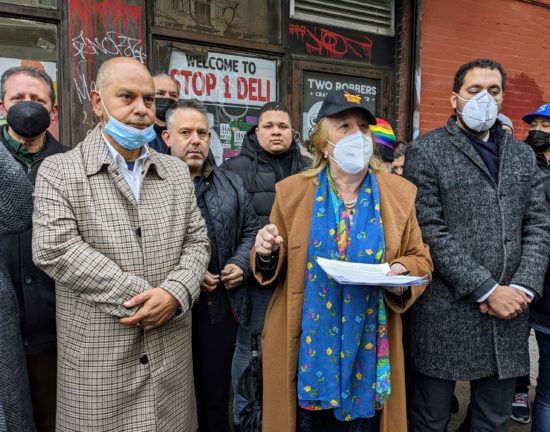
By Joy Bergmann
Council Member Gale Brewer is taking aim at grocery delivery apps, calling their operations “illegal” and an existential threat to mom-and-pop stores across the city, including her Upper West Side district.
“They’re going to kill the wonderful Latino restaurants, the wonderful bodegas, the wonderful delis, every single wonderful mom-and-pop supermarket,” Brewer said at a Sunday press conference with other elected officials and a coalition of small business trade groups held on the Lower East Side. “These Gopuffs and JOKRs and Gorillas gotta go!”
But representatives for some of those companies say their operations are being painted with an unfair brush, with critics ignoring community benefits like the jobs and positive consumer experiences they bring.
On the Upper West Side, at least five delivery companies are now operating what Brewer and others call “dark stores” or mini warehouses. Customers order items via digital apps. E-bike couriers then deliver them, with some brands promising arrival in only 10 or 15 minutes.
WSR located such operations at:
120 Riverside Boulevard (66th Street) – 1520
50 W. 72nd Street (Columbus) – Fridge No More
2409 Broadway (88th Street) – JOKR
2680 Broadway (102nd Street) – Gopuff
2681 Broadway (102nd Street) – Gorillas
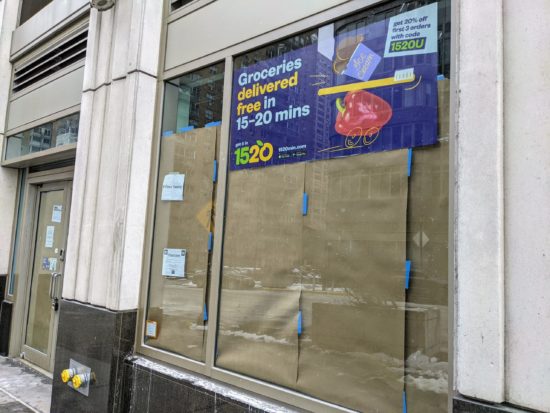

So what’s the problem? Isn’t this capitalism at work? WSR asked.
No. It’s an unfair fight with competitors who aren’t following the rules, multiple speakers said.
App startups have financial resources solo entrepreneurs can only dream of, said Brewer. “They have billions of venture capital behind them.”
Such deep pockets can fund marketing blitzes and promotions like $10 or $20 off first orders. Independent bodegas can’t be handing out $20 bills to every new person who walks through their doors, a man in the crowd said.
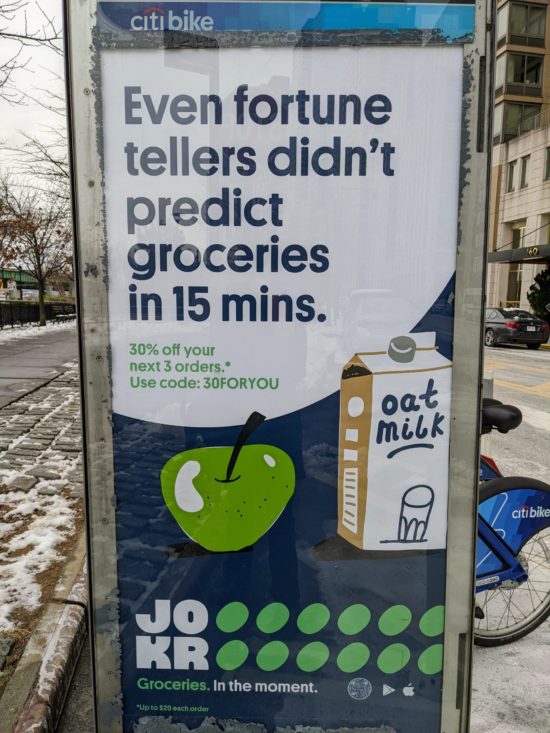
“We’ve seen this play before,” added NYC Comptroller Brad Lander, citing what Uber and Lyft did to the taxi industry and Amazon has done to bricks-and-mortar retailers. “We allowed a model of finance to come in and drive them out of business for the enrichment of a small handful of people.”
Representatives for bodegas said they’re investing in technology too, and hoping to give consumers more options. But they haven’t yet attracted the same interest from venture capital firms as the new companies.
“We are not against technology,” said Francisco Marte, founder of the Bodega and Small Business Association. “We need business leaders to work with us…to take our bodegas to the next level.”
“We have our own software,” said Frank Garcia, Chairman of the National Association of State Latino Chambers of Commerce, citing My Bodega, a delivery platform for locally owned stores that he says has not received the funding necessary to scale it. “Why isn’t corporate America supporting them? It’s economic racism. Because we’re not white from Wall Street, we don’t get that money.”
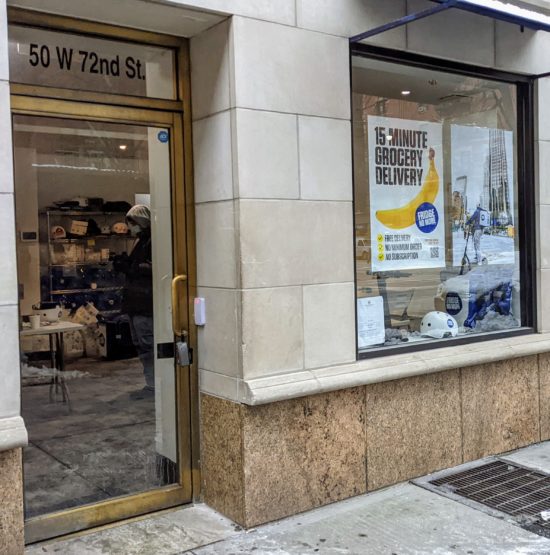
One top concern for elected officials is zoning; they say warehouses shouldn’t be in buildings zoned for commercial and residential use.
According to the NYC Department of City Planning website, “warehouses and distribution centers” belong in manufacturing districts.
Brewer raised the zoning issue, among others, in an October letter to multiple City agencies. Answers were not forthcoming.
“All we got from the Department of Buildings and City Planning was ‘we’re talking.’ That’s not good enough,” she said. “We’re going to work with the new [Adams] administration. These dark stores are illegal.”
A City Planning spokesperson referred WSR’s zoning questions to the Department of Buildings.
“These types of quick-service fulfillment centers are a new type of business in the city, and they are not specifically mentioned in existing city zoning regulations,” a DOB spokesperson emailed WSR. “We are actively working with our partners at other agencies to explore the appropriate zoning districts for these types of establishments.”
Safety is another multi-pronged concern.
Many of the app storefronts have windows covered with paper or promotional ads, reducing visibility from both inside and outside. “It screws up the streetscape,” said Brewer, indicating she believes such coverage is a NYC code violation. “It’s illegal.”
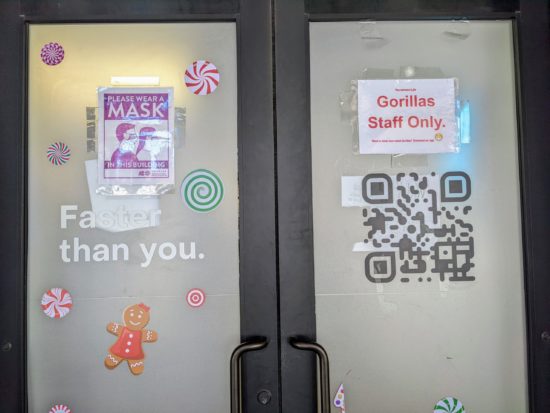
Additionally, e-bikes with lithium-ion batteries are kept within the premises, Brewer said, noting recent deaths from such batteries catching fire. “I wouldn’t want to live above there.”
And the speed at which deliveristas must complete their assignments puts them and passersby at risk, she says. “It’s insane to ask someone to get an apple to someone in 15 minutes,” Brewer said. “They’re going to make people run to the customer and run over pedestrians.”
In interviews, the people working at the businesses had positive things to say about the new delivery model.
A Gorillas deliverista told WSR he’s happy with his job. He’s paid $15 an hour plus tips and Gorillas provides the e-bike. He said the 2681 Broadway location is busy, operating from 8:00 a.m. to 11:00 p.m. “Milk,” is the most popular item, he said.
“It’s cool,” said a storefront worker at Gopuff. She said their 2680 Broadway location delivers 24/7 and “Covid tests” have been flying out the door.
“Bread, eggs, milk,” are what’s hot at Fridge No More at 50 W. 72nd Street, a deliverista told WSR.
All three workers called their workplaces “warehouses” and said people could not shop inside them.
A JOKR manager prepping his 88th and Broadway location for its recent opening said customers could pick up their orders in addition to taking delivery.
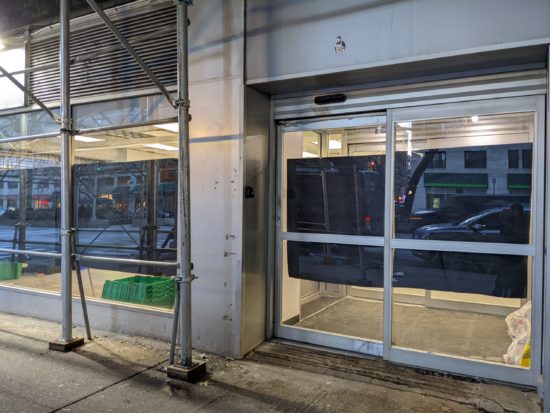
WSR emailed detailed questions to all five companies operating on the UWS.
Germany-based Gorillas sent back a basic press release and “backgrounder.” It highlighted Gorillas’ treatment of “Riders,” providing training and full-time employment terms and benefits including health insurance and paid vacation.
1520’s message bounced back from the address shown on its website.
JOKR emailed a statement emphasizing its community engagement and policy of hiring full-time W2 workers receiving “a competitive wage and full benefits” as well as “comprehensive safety training.”
“The JOKR community lives and works in the same neighborhoods we serve and, as such, the safety of our riders, our neighbors and our customers is of paramount importance,” wrote a spokeswoman.
JOKR also works with third-party service providers like Too Good To Go for pickups of “discounted goods that would otherwise go to waste,” she said.
JOKR, which lists New York and Luxembourg addresses on its website, says its business is meeting, “an ever-increasing demand from consumers for more spontaneous, more personalized and more convenient delivery of fresh products and favorite local brands.”
Brooklyn-based Fridge No More did not respond to WSR.
But a Gopuff spokesperson did address several of the allegations made by app opponents.
“Gopuff does not operate dark stores in New York City,” she wrote. “Customers can walk-in, or buzz to walk in at all of our New York City locations. Each location has a Point of Sale System and a cash register to facilitate customer transactions.”
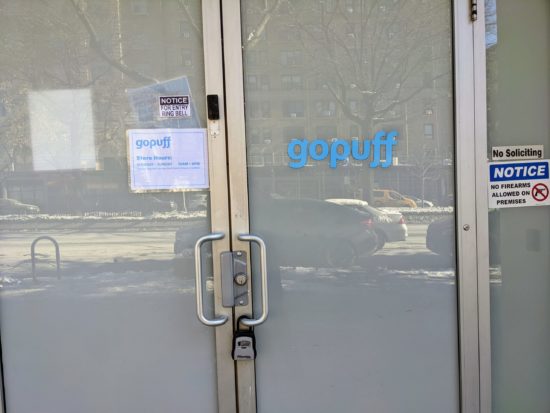
“We work to ensure that we are compliant with zoning regulations in any city we launch operations in,” the Gopuff response continued.
“Gopuff has a unique assortment of products…and partners with local brands to support their distribution, as well as work to ensure excess goods from our locations are donated to Feeding America or one of their local affiliates.”
About employment, the Philadelphia-based company said, “If someone wants flexibility and the freedom to work on their own schedule, they can become a delivery partner as an independent contractor (the average U.S. delivery partner earns between $18-25 an hour with Gopuff). If someone is seeking more predictability and benefits, they can join our local or team as a full- or part-time employee.”
Gopuff added, “New York has a rich and storied culture of bodegas, delis, and corner stores, and we want to supplement and complement their offering for consumers.”
Brewer’s not buying it, vowing to pursue every avenue to reverse the apps’ proliferating presence in these pandemic times. “They’re opening up every minute. But we’re going to keep this up,” she said. “We’re going to fight to keep our bodegas and get rid of these dark stores.”
Legislation may be coming.
“We need a comprehensive regulatory framework to get every illegal business off the streets,” said Brooklyn Council Member Lincoln Restler. “We’re going to do everything we can to lift up bodegas, to help provide new technology, to help provide real relief from the city, state and federal government. And, most of all, to encourage each and every one of our neighbors to shop at the stores that make our neighborhoods.”



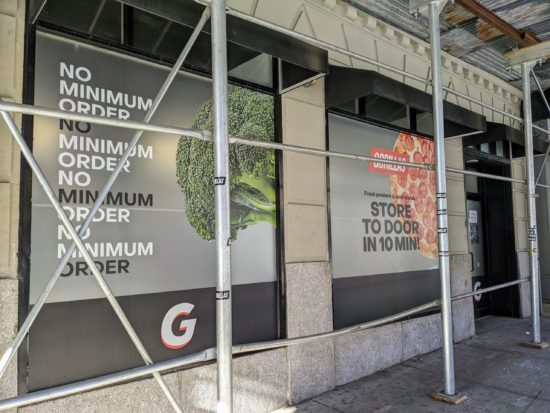

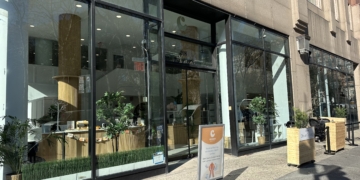



I wish Brewer would get her facts straight before she rants about something being “illegal”.
There is nothing “illegal” about these grocery delivery apps and there is nothing “illegal” (or unethical) about these apps being backed by deep pocketed investors.
Furthermore, there is nothing “illegal” about these distribution centers being located in our neighborhood. With all the empty storefronts on the UWS Brewer should stop complaining about taxpaying businesses that employ people occupying space that would otherwise likely be empty.
True, these apps might be hurting small businesses but that’s life. Many of these bodegas offer low selections and high prices. Consumers should decide which business model is best, not bureaucrats.
I wish Brewer would do something productive for her constituents instead of engaging in cheap and nonsensical political pandering.
Thank you, Gale Brewer, for standing up for bodegas and mom-and-pop operations. It’s good to have you back. Thanks too for recognizing the proliferation of bikes these warehouses bring. Many UWS-ers, especially but not only seniors, have had bad if not fatal encounters with speeders aiming for ridiculously fast deliveries.
Thank you!
Gale Brewer is just getting warmed up. Just think two years of her being ticked off every other day about this or that before next election.
A couple of things
* the only reason why these companies have
very visible Broadway locations is that
there is such an enormous vacancy rate.
I am sure they will move once there is more
demand for such places and rent goes up.
If they do violate zoning rules I would be in favor
of changing those rules as I do no think they are
any worse than restaurants or dry-cleaners.
* the delivery fee (by at least one of the apps) is $2 + tip.
If the bodegas cannot compete with that and the
fairly limited selection of the app I think they
need to reinvent themselves
* they delivery times quoted by (at least one) app
will vary and can go above 20min at times.
If you look up the city code, Otis, you’ll find zoning laws and regulations. You won’t find “zoning suggestions”. Breaking those rules, is, in fact, illegal.
The apps themselves are legal, but they aren’t worth much if they can’t manage quick delivery times (Bodegas have lasted this long on convenience, not discounts). And they can’t manage those delivery times without converting local commercial real estate into industrial warehouses. That’s bad for the neighborhood.
Isn’t it a stretch to call these ‘warehouses?’
I’m no expert on the zoning resolution, but I could find no definition of the word ‘warehouse’ which is a real problem for those objecting to this business model. A warehouse – as commonly understood – is a place for storage of goods then transported for retail use. It’s got truck bays where trucks load as well as unload. Frequently there are sidings with rail tracks and, along the water, there are loading docks.
These are retailers, dedicated to delivery only, where trucks delivering goods to these stores are indistinguishable from those delivering to Fairway or a bodega or a deli. And the bikes that come out of them for delivery to the retail customer are indistinguishable from the bikes ridden by delivery workers for Instacart or a bodega or a restaurant.
Calling these “warehouses” to use the zoning resolution as a cudgel is likely to be a non-starter.
@ Don Kedick
Please provide the citation in the zoning laws that these food warehouses are breaking rules and illegal.
Just because you don’t like a business practice this does not make it “illegal”.
NYC Zoning: Warehouses are in Use Group 16D which are only allowed in C8, M1, M2, M3 zoning districts.
The question of whether these storage/distribution sites are considered “warehouses” is where the debate will happen.
At least these dark stores have real estate. Better than the online grocery providers that illegally park semi trucks on the street and utilize public space as a distribution center. How can a local shop compete with a place that takes prime real estate for free?
Good point
Additionally, e-bikes with lithium-ion batteries are kept within the premises, Brewer said, noting recent deaths from such batteries catching fire. “I wouldn’t want to live above there.” – Brewer could address this issue directly by providing secure, on street parking for these bikes. I don’t understand why Audis get free on street parking and essential delivery workers are forced into dangerous conditions.
They’re not essential. The city was fine without them, just different and, for pedestrians, safer.
If business was restricted to only those considered essential, well, hello Soviet Russia!
We’re safer with ebikes bought and maintained by companies with insurance and accountability. Those companies, charging their batteries in their stores, are far less likely to buy the aftermarket crap that are causing the fires and fatalities.
To the extent that these companies are paying rents, paying commercial rent taxes, paying employees ON THE BOOKS and not “independent contractors” or off the books help (as many small stores often do),
they’re far superior to firms like Fresh Direct and Amazon which usurp our streets as distribution centers, undercutting retailers who pay for the streets with their taxes,
and they’re far superior to the delivery services like GrubHub and Seamless who call their workers “independent contractors” and literally cannot survive unless their point-of-service personnel violate every applicable regulation related to the operation of their motorized vehicles.
These companies may be reprehensible but on that scale, they’re far from the worst.
My main complaint about these places is that the ebikes are always on the sidewalks on Broadway and 102. The delivery workers open the doors and come flying out on their e-bikes, weaving in and out of pedestrians and honking their horns the whole way. I have no issue with e-bikes as a whole, but people need to abide by traffic laws.
This would be hilarious, if it wasn’t so stupid.
Picking one business model vs. another, because of some nonsense about…not being “white from Wall Street”? (cue: look up the immigration background of some of the most successful, Wall Street-backed entrepreneurs)
Pandering about the dangers of fast delivery, at a time when every restaurant in the city uses bike deliveristas? What happened to protecting those hardworking people?
Insane to ask for 15-min delivery? So we’re to believe Gale never orders delivery, or prefers to come as late as possible?
e-Bike storage in buildings? What does the teenager next door do with their bike?
Ruining the streetscape? Like there isn’t a plywood dining shack and/or homeless encampment every 10 yards all over the city?
Code violation? Pls tell us more about those 20-yr scaffoldings or the restaurants reducing sidewalks to literally impassable widths all over the UWS.
Cheap political pandering at its best.
This response is a near-perfect skewering of the arm-flapping “save our bodegas” hysteria that regularly erupts here.
Thank you, Peter.
Let the consumers vote with their wallets and the free market can play this out. 1520, mentioned in this article, is already out of business! The market will grow, consolidate and at the end, there will be a few companies operating a handful of delivery stores that provide value to customers.
My family uses Fridge No More and they are amazing. The customer service is great, couriers are friendly and I routinely see the same faces riding around. Have you tried shopping at a Duane Reade lately? It’s an awful experience because these stores are busy with the rampant stealing and crime. Let’s focus on the crime and bigger issues than companies providing a service that most consumers enjoy
It makes sense that 1520 would already be out of business. Their advertising showed an avocado, which generally are sold hard/unripe. Who is going to pay a premium to get an emergency avocado delivered in 15 minutes, and then wait 2-3 days to make their guacamole or avocado toast? You need to order it 3 days before you need it.
Good point about the safety issues to be considered when shopping in local stores these days. Some people don’t want to take the chance that a mob will do a smash and grab while they’re shopping.
I was in the CVS at W77th St today and couldn’t get a tube of toothpaste without someone opening up a locked case. A $6 tube of toothpaste. And she had to stand there the whole time I was trying to find what I wanted. How can stores stay in business like that?
Really, Boris? Have you seen so many “smash and grab” mobs? I shop on Bway all the time and have never seen one.
bodegas take advantage of real stores by underpaying their employees, selling untaxed cigarettes, and acting as distribution points for illegal substances
they don’t need protection by the gov. they need protection from the gov
I do not understand how this is going to be a sustainable business model and I think most of the VC firms will take a bath on it. That being said, it is their right. They are doing nothing wrong.
I wish Brewer and others would focus on the real quality of life issues that impact us like the mentally ill, homeless and rats on our streets.
Yes! Thank you Juan. We have real problems on the UWS. False indignation is such an obvious cover for real issues. Wonderful bodegas? Wonderful mom+pop delis? Where does she live? Not the UWS. Lost in scaffolding, empty stores, filthy Fairway, homeless addicts and on and on. Get real Gale.
But they “screw up the streetscape”! Economic innovation and jobs are ok, but we can’t screw up the streetscape!
(I’m not a fan of sarcastic posts, but I couldn’t resist.)
Yet another “innovation” contributing to making New York City unlivable.
NYC needs legislation to protect supermarkets, pharmacies, and bodegas.
SIGH
People insisting that the ‘free market’ and that ‘voting with your wallet’ should determine the business outlook in the city do not live in or care about the quality of life of local residents. ZONING is why there is a vibrant corner store or restaurant scene in certain areas of the city. When those business start disappearing and are replaced by banks, mega mall stores and dark “store”/warehouses, that is gentrification and elimination of the quality of life for locals.
This needs to be fixed with proper zoning and enforcement. And Gale, if you’re reading this, can propose some local tax incentives to give a break to newly opened local business that open in empty storefronts, and incentivize (or penalize) landlords to rent to local NOT CORPORATE businesses?
I often wonder whether people ever read back what they wrote before hitting the send button.
How would you legally justify a ban on landlords renting their private property to a corporate entity? Just think for more than a nanosecond what you’re advocating.
Race-baiting as a business model – what can go wrong… It’s despicable and must be stopped.
Gail Brewer had been in sinecure positions (paid by us the taxpayers) her whole life. She should be working for everything that improves daily lives of New Yorkers, not the opposite.
“Wonderful bodegas” indeed…
The delivery people for these businesses ride their electric bikes and little motorscooters on the sidewalks, ride against traffic, and don’t stop for lights or pedestrians. They just swerve around and think that is ok; I’ve been swiped by their handlebars. As a senior citizen, I find them a serious and scary hazard and I can still see and hear, unlike others of my age
Yes, the e-bikes on the sidewalk are a legitimate problem, but that needs to be dealt with by the individual companies, with governmental intervention if necessary. That has nothing to do with the business model itself, which seems like a good one.
Many of the “let the free market decide” commenters are ignoring one of the most salient points: these businesses are pursuing the Uber model, only in a different sector. We see what Uber did to taxi drivers. Do we now want Wall Street venture capital to do the same to bodega owners?
This business model is a “bait and switch.” Use deep pockets to destroy the small biz market, then raise prices. Let’s not fall for it.
NYC politics is a constant struggle between “the little guy” — tenants, small business owners — and the forces of large real estate and large finance. Thank heavens there are honest elected officials out there like Gale Brewer who will use every lever to level the playing field and try to make life just a little easier for working people.
I don’t think many are ignoring the flaws in their business models, or the impact they may have on competition. But none of that is “illegal”. People are free to burn their billions, if that’s what ultimately transpires. And I don’t think we need to glorify the older business models either -there are many former taxi drivers who are happier driving for Uber without the weight of a $1.5mm medallion, and how many people really need those 2-yr-old cookies stuck on the back shelves of a bodega?
The point is that a press conference attack (i.e., a warning shot across the bow), full of questionable arguments, is pointless and laughable as strategy. If anything, it allows these apps to tweak their business models to avoid non-compliance with any laws. (Probably takes 5 minutes to convert a “warehouse” into a “bodega with storage room”, “1 customer at a time”, for all legal purposes).
So, nothing will be accomplished, but we score some votes with some people who think they’re being helped by politicians.
Great reporting from WSR on this complicated story. I actually used GoPuff on someone’s recommendation to get covid test delivered… they were very prompt but I still don’t understand the business model and glad there is at least a spotlight being shone on this to examine further regulations. I also wonder — without evidence — how many of these are gearing up to cater to the “midnight munchies” as pot becomes legal.
Not only are they gearing up for the “midnight munchies” crowd. I suspect some of them will be offering actual cannabis delivery (GoPuff, for crying out loud. And JOKR, named after the famous Joker rolling paper company, I again suspect), and I see nothing wrong with that.
And yes, great reporting from WSR, as always!
I love it when seriously ill-informed readers comment on WSR. And how eager they are to rid this city of its zoning codes. No, warehouses do not belong in retail, residential districts, period. You know why?? Because they are not zoned for them!! They are zoned for warehouse districts. Just what is it you don’t get about that?? Maybe we should raise farm animals in some of those empty retail spaces-how about chicken farms?? In this new anything goes-who needs pesky laws and regulations mentality, why should anyone have any restrictions at all?? And another thing-I’m getting pretty tired of almost getting run over by delivery bikes on the sidewalks where pedestrians walk. Oh right-That’s illegal too but who really cares when there’s a buck to be made-or those wanting potato chips and Coke Zero delivered in under 5 minutes.
What a laughable attack by Brewer. These grocery delivery services are not even close to the same market as consumers at “Latino restaurants, the wonderful bodegas, the wonderful delis, every single wonderful mom-and-pop supermarket.”
I suppose it’d be better for the workers of these companies to be out of a job and for the consumers to not be able to access the goods that they’d like to purchase.
Time for Brewer to go!
I like to eat, I cook and go out to restaurants but I’ve never ordered from one of these services.
LOL what? I use these all the time, they are great for people who can’t get out of the house.
These people do not have “billions” behind them. Being valued at 1 billion has nothing to do with how much venture-capital money you have taken in. Rather, that is the amount that investors agreed the company was worth when they purchased their partial stakes. You can say that anything is worth a billion dollars if you want to. Valuations mean nothing in the real world. They are just a bargaining platform that startup founders use when they go to sell off parts of their company.
VC, you didn’t follow the link. Gorillas alone has raised close to $1 billion Series C funding and was valued 2.1 bil pre-money. So yes, cumulative these services have raised billions in real $s.
Ms. Brewer seems enamored with the term wonderful: “They’re going to kill the wonderful Latino restaurants, the wonderful bodegas, the wonderful delis, every single wonderful mom-and-pop supermarket.”
Wonderful would be for her to do something about those countless sheds, scaffoldings, bridges and nettings all over the Upper West Side. Buildings are ordered to fix their facades by the Department of Buildings. This necessitates the erection of a shed. But hardly any repairs take place after the mandated sheds have been erected. It is an eyesore, an inconvenience, an irritation for building residents and neighbors alike.
I contacted Ms. Brewer when she was still Manhattan Borough President as we had been pestered by the construction shed next door for more than seven years. We even lost the peaceful usage of our own roof deck.
Never did Ms. Brewer respond to my letter, let alone do something.
If you really believe in wonderful things, Ms. Brewer, put an end to the Upper Shed Side and give us back our beloved Upper West Side.
An obvious solution to the eternal scaffolding problem is to give individuals a right to collect damages from the perpetrators.
I agree they are a blight but what exactly are the civil damages caused by scaffolding that give a plaintiff standing?
Wasn’t Community Food & Juice moving into 50 west 72nd? Why is Fridge No More there?
Community is moving into a different space in the building; multiple entities share that same 50 W. 72nd Street address.
Thanks for reading!
Thank you, Joy Bergmann! Your reporting is always 1st rate and your topics always open the hearts and minds of your readers.
Here’s an idea. Maybe one of those kid entrepreneurs featured previously on WSR can come up with a way to get disposable email addresses and connect seniors in need to take advantage of the coupons. The bodegas themselves can also create multiple accounts to use the free credits and resell the items for less than they do. If you can’t beat ’em bankrupt ’em.
Some of the accusations against the “dark stores” are ridiculous but there are some real issues here.
1. Residential areas are not zoned for warehouses. So, potentially these dark stores are illegal. We can certainly review or change the zoning code if we want, but to the extent that the reason for not having warehouses in residential zones was that we want establishments which can be visited by people walking on the street we might not want to.
2. It is very unclear how these businesses are viable. There aren’t that many things I need in 15-20 minutes as opposed to tomorrow and online shopping is ultimately price sensitive. Long term, these dark stores are competing against Amazon, not bodegas. That is not a competition they are going to win. This is a problem if these business will fail but only after destroying businesses that are themselves useful.
3. It is fairly clear that NY would be better off if bodegas were replaced with larger supermarkets. These are generally cheaper and have better selections. But, while it appears that only bodega owners are complaining now, these dark stores are ultimately as much of a threat to supermarkets as they are to bodegas. And if that is true, this poses a very real problem.
@quill, when you say it is an unadulterated good that bodegas be ALL replaced by supermarkets, you are not considering the social impact of bodegas. The class of bodega owners is a relatively stable component of various immigrant communities, particularly Latinos/as, but not limited to them. See the Yemenis. And the Koreans (now fewer).
While supermarkets are needed, good bodegas play an important role as well. And I’ll bet money spent in bodegas has more “velocity” and a bigger multiplier effect within these immigrant communities.
Gale Brewer is right; bodegas need protection. And you’re right as well: if the bodegas are conquered, the supermarkets are the next step.
Really Gale? With so many quality of life issues in the neighborhood this is what you’re spending your time on? So disappointing…
I use Buyk (109/Amsterdam) and they are friendly, fast and have a much better selection, at a lower price, than any bodega in my neighborhood. They are a lifesaver when in the middle of dinner and an ingredient is needed. Do not see why they are illegal, and Brewer is just pandering. They employ locals and pay rent on empty storefronts.
If Gale wants to legislate this stuff behind the scenes then go ahead, but any public event just brings the companies publicity. I’d never heard of most of these before though I do remember Kozmo and Urbanfetch from about 20 years ago.
The only issue I see is that their locations can be considered warehouses which don’t meet the zoning requirements. I don’t see much of a difference between their impact on a neighborhood as a warehouse vs. a retail store. It’s probable that these small warehouses have a smaller impact than retail stores like Fairway, Citarella, CVS, Duane Reade, Zabar’s, & Target in terms of loading zones and the use of sidewalks for staging deliveries.
It’s funny how everyone hails fruit/vegetable street vendors like the one at 77/78th St who not only occupies an excessive amount of sidewalk but also feels entitled to park his supply truck there 24/7. And then people complain about dirty streets when the sweeper is not able to clean a much larger area of the street because of his truck. If I call a plumber to make repairs, he’s likely to get a ticket for doing the same thing for a much shorter period of time. There’s a weird dynamic about whom we support and how we justify our biases.
How times have changed. I can remember a time when the bodegas were attacked by the politicians for selling inferior non-nutritious food at inflated prices to the poor of the community. Now, somehow they have morphed into
stalwarts of the community to be preserved for future generations.
I’m not sure what is “illegal” about these operations and for the, well, typically misinformed Brewer to careless throw around this inflammatory term is disappointing. I don’t use these services but it seems to be that convenience, variety and freshness of merchandise provide a significant benefit to the community as well.
I am a senior living on the UWS, and I have found these delivery services a life-saver during this Covid surge. I have other health problems, and running out to the local bodega is not easy for me. Additionally, I find the selection at my bodega limited and the prices much higher than on the apps, a major consideration for someone like me who lives on Social Security. Rather than trying to ban the apps, perhaps Ms. Brewer should think of constituents and not just the businesses in her district. I voted for her, but am beginning to regret my vote.
There’s also one on 77th between Broadway and Amsterdam, north side of street. Customers aren’t allowed in. Do customers REALLY need milk in 15 minutes?
What’s your point? If they don’t NEED it in 15 minutes, then they don’t need either the delivery services or bodegas.
I would have to agree with the people on here that think this is a stupid thing to be worried about. My building had some offer with one of these services (Avo) and I tried it. It sucked. The quality was horrible, overpriced, and I was just mad at myself for not walking two blocks to go to Fairway. The only reason these services are doing well is Covid. I have changed most of my food behavior during the pandemic, but I still risk death twice a week to go to Zabars because life wouldn’t be worth it otherwise. I’m still afraid to go into the Trader Joe’s basement however. Anyhow, we have real issues in the neighborhood…let’s not worry about crap food delivery services at least till it is safe to breathe again.
If you get to Trader Joe’s just around 8:03 unti about 8:20 a.m., 90% of the time you’ll be able to walk right in, and you’ll experience no wait.
The store remains very clean, safe and spacious.
Get on the left line for checkout. That way, you’ll be freer to create distance for yourself, in case somebody close by has a loose mask or nostrils exposed!
I should have added this tip:
If you are accompanied, have your companion work one floor while you work the other. That way you’ll be at checkout before the line grows.
Forget about whether or not these types of services should be allowed to operate. The question is WHY do they exist, especially in a borough like Manhattan where nothing – including the corner bodega – is seldom more than a block or two away. How lazy do you have to be to not get off your rear and go out to make the purchase yourself? You support local business and get a bit of exercise and fresh air.
Brewer is reflexively leftist. When she was previous a Councilmember, she spent her time passing legislation prohibiting additional bank branches on the UWS.
Sorry for the typo. The word is obviously “previously.”
Today it would be different.. If not for the large number of bank branches the commercial real estate market would collapse if the banks decide en masse not to release expiring leases.
She should worry more about gun violence, extreme violent mental illness and violent homeless men and women on our streets plus the constant STABBINGS in New York City. I emailed her so so many times about these REAL EXTEME issues and this is what she holds a press conference for?
Any article talking about unfair competition with local grocers should mention FreshDirect, which depends on illegally parked trucks staying on streets for hours at a time. At least these new services are paying neighborhood rents, unlike FreshDirect, which just pays far less with reduced rates for parking tickets, while making our streets more dangerous.
I do have a great concern with guarantees of 10 or 15 minute deliveries, as these force delivery people to be reckless to deliver groceries quickly.
Nice to have Gale Brewer back on the case.
I agree with limiting the danger posed by batteries indoors. Which is why I endorse banning electric vehicles from garages located underneath residential buildings, given the recent terrible apartment fires we have seen in the news.
Ahhh the UWS leftist obsession with more regulations for everything and everyone…
I stopped frequenting the bodega in my neighborhood years ago. Every time I went in, I was put off by the lack of cleanliness and the smell of cat litter. That said, I tried to get deliveries of milk on multiple occasions when going out to the grocery store would’ve been a hassle, but I experienced inconsistencies, phones not being answered, or no-shows. For the past three months I have been using one of these fast delivery services and I couldn’t be happier. They are providing a products, and a valuable service. If the bodegas want to compete, they need to step up their game… and broaden the array of products they offer, such as selling bananas and not only plantains. Everything else Brewer is pointing to is a distraction.
If she wants to be consistent she should also take on Fresh Direct, Peapod, Amazon etc but I’m sure she won’t.
These apps are awesome and so much cheaper than the local supermarkets. (Looking at you Brooklyn Fare which our illustrious local politicians claimed was low cost – please).
Totally agree our buddy Gale should be focused on keeping our neighborhood safe – work on reducing crime etc…
Dear fellow readers. . . I enjoyed reading ALL (to date) of my fellow readers’ comments, both pro & con. . . .Thank you Ms Bergmann for your article and to the the West Side Rag, which really covers Upper Westside news. . . I know, I know; many consider Gale Brewer an annoyance. She can be pesky, but she’s an honest pol and atop the issues. (And that’s why she really should have become the N.Y.C. Council speaker.)
“Build it and they will come”. As long as people patronize these delivery businesses they will succeed. If the local small stores, the Mom and Pop stores that are supposed to be the backbone of a community are destroyed because the community needs a quart of mils at 11pm so be it. Hey folks, that’s capitalism. And as we know it all trickles up to Wall St. and the deification of the dollar. Greed and sloth will win every time.
Go live in Venezuela then. And don’t you own a 401K? If yes then stop being a hypocrite with your good old Wall Street trashing.
Definitely reminds me of the early 70’s when movie theaters advocated against “cable TV”. Theaters said cable would put them out of business! “Support Your Theaters” was their message. How’d that work out? Both co-exist today and both are making profits! There are 25 screen theaters now! A proliferation of streaming cable networks. Perhaps “Dark Stores” and “Bodegas” will co-exist too! Time will tell. I reserve my opinion as these “dark stores” have yet to “gobble” each other up in buy-outs, mergers or flat out failings!
Gail Brewer should be focusing her efforts and energy on ridding our streets of criminals and filth instead of going after new businesses who are employing people and providing a positive service to the community.
UWS bohemian leftists really have serious issues with free market and capitalism… Go live in France.
FYI there’s now a “Getir” delivery store inside the former Lenwich space on 96 + Broadway. No fanfare, no grand opening – just … pull up the app and order.
I remember when taxis would not stop for me on the UWS, or having to learn not to share where I was going until I was seated, with that door close (otherwise the taxi would speed away like everything above 125th was a war zone). Twice I forced an available taxi to stop by walking in front of it, stupid I know, but desperate and frustrated.
Uber completely changed my entire taxi experience. The app could not see the color of my skin, and these drivers were willing to pick up and drop off during anytime and anyplace in the city. The fact that they met a need that yellow cabs weren’t is not the apps fault. The yellow cabs’ business model was outdated and the monopoly they had on sub-par service was not something to be cherished. Competition is what fuels our economy.
I agree that new industry must be regulated, not eliminated. The bodega apps are not perfectly good or perfectly bad for residential neighborhoods, just new and need to be assessed by unbiased regulators with common sense, safety and tax payer concerns in mind.